Harold Lucas was born and educated in Birmingham and spent his entire working life there in the manufacturing industry. After leaving
Little Green Lane School in Small Heath he initially went to work with the
New Imperial Motor Cycle Company in
Princip Street in the city's gunmaking quarter; and then later with other local companies, especially 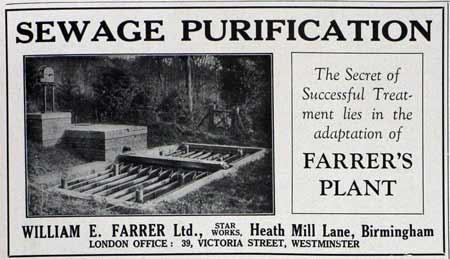 William E. Farrer Ltd., manufacturers of sewage treatment equipment located in
Welby Road, Hall Green and in
Heath Mill Lane, Digbeth where amongst other activities he started in 1938 a Sick and Benevolent Fund whose Secretary and Treasurer he was. There was break in service with that Company: for a while he joined forces with another Farrer employee who left to form a new company named
Thatcher, Lucas & Co. Ltd. in
Moseley Road. The war years were however spent as an employee of Farrers at their
Heath Mill Lane works. It was at the latter, known as the
Star Works, that Harold found himself working on the design and development of jigs for the manufacture of Lancaster aircraft wings.
William E. Farrer Ltd., manufacturers of sewage treatment equipment located in
Welby Road, Hall Green and in
Heath Mill Lane, Digbeth where amongst other activities he started in 1938 a Sick and Benevolent Fund whose Secretary and Treasurer he was. There was break in service with that Company: for a while he joined forces with another Farrer employee who left to form a new company named
Thatcher, Lucas & Co. Ltd. in
Moseley Road. The war years were however spent as an employee of Farrers at their
Heath Mill Lane works. It was at the latter, known as the
Star Works, that Harold found himself working on the design and development of jigs for the manufacture of Lancaster aircraft wings.
Harold, like almost every other Birmingham man employed in manufacturing thus found himself contributing directly to the war effort - their factories either turned over full-time to war production or contributing part of 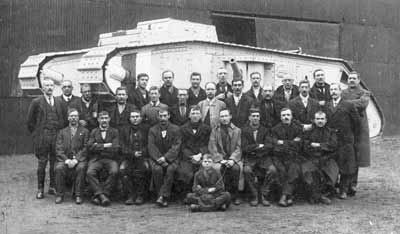 their effort whilst maintaining production of other equipment and materials essential to the continuing life of the nation. This had all happened before, and quite recently. Only 25 years earlier Harold's own father, employed by
Metropolitan at
Saltley, after manufacturing railway rolling stock found himself producing many of the tanks used by the British Army in the second half of the Great War. Here is an image of him and his colleagues from 1917.
their effort whilst maintaining production of other equipment and materials essential to the continuing life of the nation. This had all happened before, and quite recently. Only 25 years earlier Harold's own father, employed by
Metropolitan at
Saltley, after manufacturing railway rolling stock found himself producing many of the tanks used by the British Army in the second half of the Great War. Here is an image of him and his colleagues from 1917.
Harold, by then a married man and no doubt working long and arduous hours, somehow found the energy to engage in further activities in defence of his family and country. He built an underground bomb shelter in his father's back garden, solid enough to save lives when neighbouring houses were damaged and too substantial for easy demolition in later, happier years - a lawn was laid over it and it is probably still there.
In 1942 he joined the Home Guard. He had wanted to enter the RAF but was refused on the grounds of his essential war work. And so this was the next best thing. Training sessions were three days a week and he gained a stripe for the rank of Lance Corporal. Various anecdotes from this time and later related by him are remembered within his family. There was the occasion when the squad were marching along and somehow or other their superior disappeared into a deep ditch. With commendable miliary discipline - and no doubt much ill-concealed laughter - the column proceeded smartly on its way without the slightest break in step, leaving the unfortunate officer the task of clambering unaided out of his predicament and running to catch up with his men.
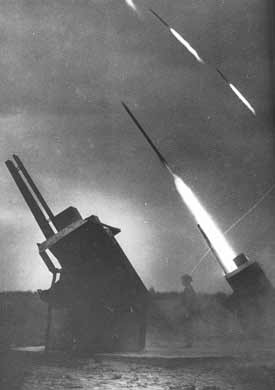 During 1942 there was a move towards the deployent of many Home Guards on anti-aircraft defence duties. Whilst some of the batteries were equipped with traditional guns many were the new "Z" Batteries using the secret rocket weapon known as the UP (Unrotating Projectile), a 6ft long 3" tube designed to be fired in salvoes and create a barrage of fire and explosion at a pre-determined height of up to 19,000 ft. A number of Birmingham A-A batteries were equipped with this fearsome weapon.
(Excellent first-hand descriptions of this device and how typical HG batteries operated can be found
here and
here - you will leave this site in each case).
During 1942 there was a move towards the deployent of many Home Guards on anti-aircraft defence duties. Whilst some of the batteries were equipped with traditional guns many were the new "Z" Batteries using the secret rocket weapon known as the UP (Unrotating Projectile), a 6ft long 3" tube designed to be fired in salvoes and create a barrage of fire and explosion at a pre-determined height of up to 19,000 ft. A number of Birmingham A-A batteries were equipped with this fearsome weapon.
(Excellent first-hand descriptions of this device and how typical HG batteries operated can be found
here and
here - you will leave this site in each case).
And so Harold found himself in due course abandoning traditional Home Guard activities and instead manning an anti-aircraft rocket battery on
Billesley Common - known as
107th Warwickshire Battery. His stamped attendance card suggests that this part of his service might have dated from December 1943 although it may well have been earlier.
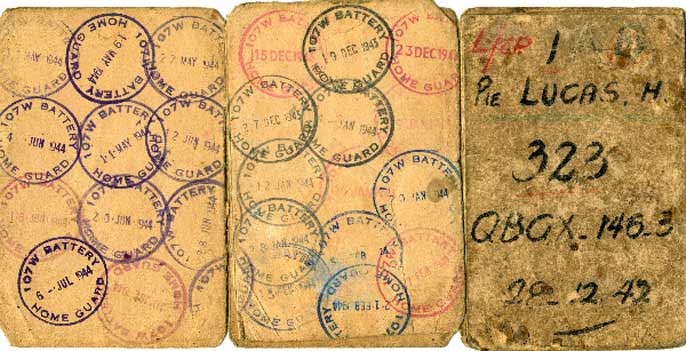
Ever resourceful and inventive - he had a long history of proposing innovative solutions to problems in his day job - he found a way of recording information and settings which were difficult otherwise to see in the dark when the rockets were being fired; this involved a system of chalk markings on the floor.
The traditional Home Guard equipment of rifle and bayonet became a liability in the cramped conditions of a gun battery and its living quarters. After an officer was nearly stabbed in the throat the bayonets were removed from the men, rapidly followed by the rifles - there was no ammunition issue in any case! In order to defend the battery against enemy incursion they were each issued with a wooden staff. The effectiveness of these weapons against the might of the German Army was fortunately never put to the test but they found their true purpose - to serve as fuel on cold winter nights.
Just as he had done several years ago at Farrers, Harold Lucas became deeply involved in the establishment and operation of a welfare fund for members of his unit, apparently
No. 1 Relief of the 107th Warwickshire Home Guard Battery. Such funds were established in many H.G. units, aimed at funding recreational activities like social events, sometimes children's Christmas parties and gifts, creature comforts to Home Guard members, and the occasional relief of personal difficulties - in other words a system of supporting the members and families of a unit and generally brightening up the fairly grim life of the times. The one for Harold's group was formally entitled 223 (107 WARKS.) H.G. No. 1 WELFARE FUND. Its President was Capt.
P.L. Field, Chairman 2/Lt. N.H. Ettritch, Treasurer Pte.
Swan, Secretary Harold Lucas and other Committee members Sgt. Cook, Pte. Walker and Pte.
Beach. These are its rules:
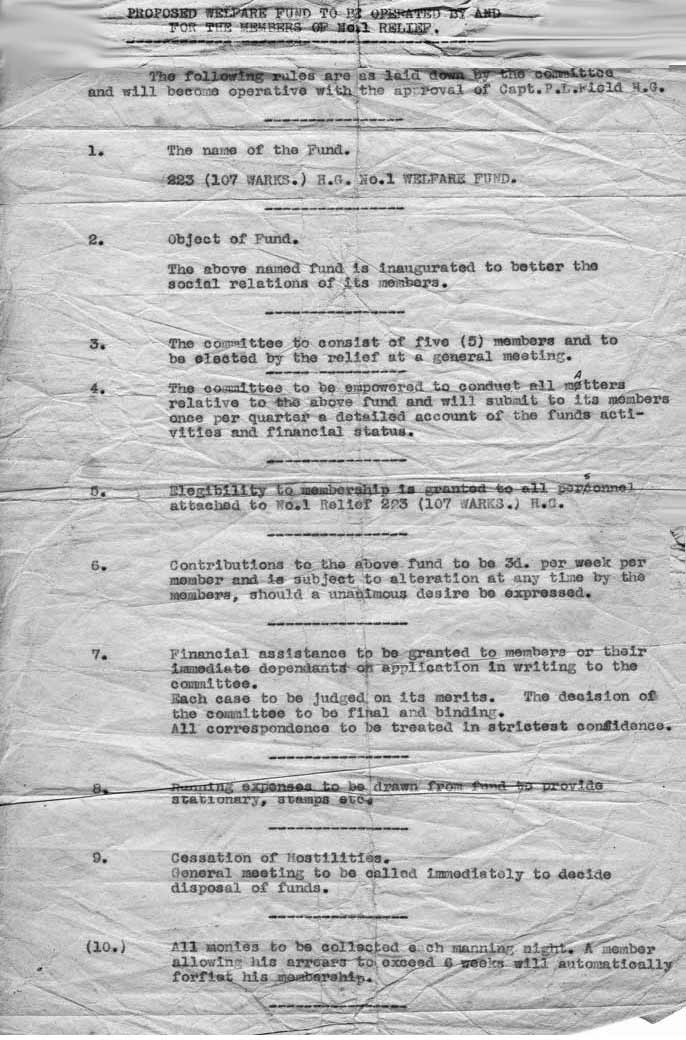
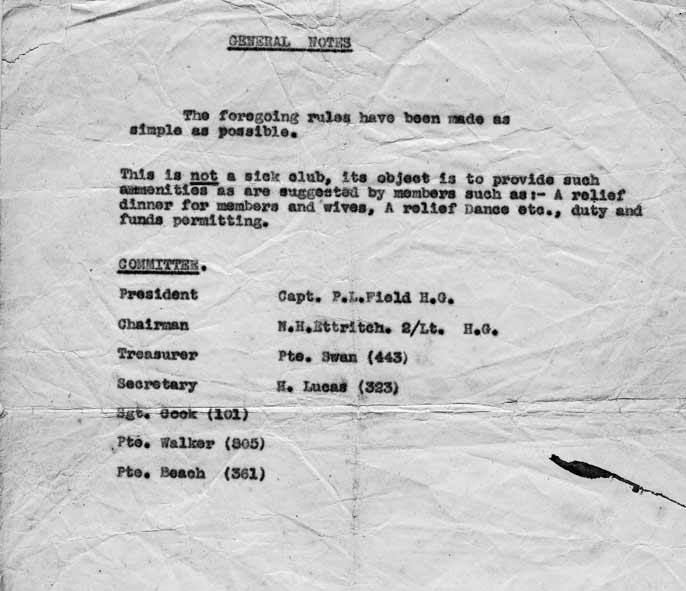
Stand down finally came in December 1944. The service given by Harold and his comrades was acknowledged individually by his Sovereign, King George VIth.
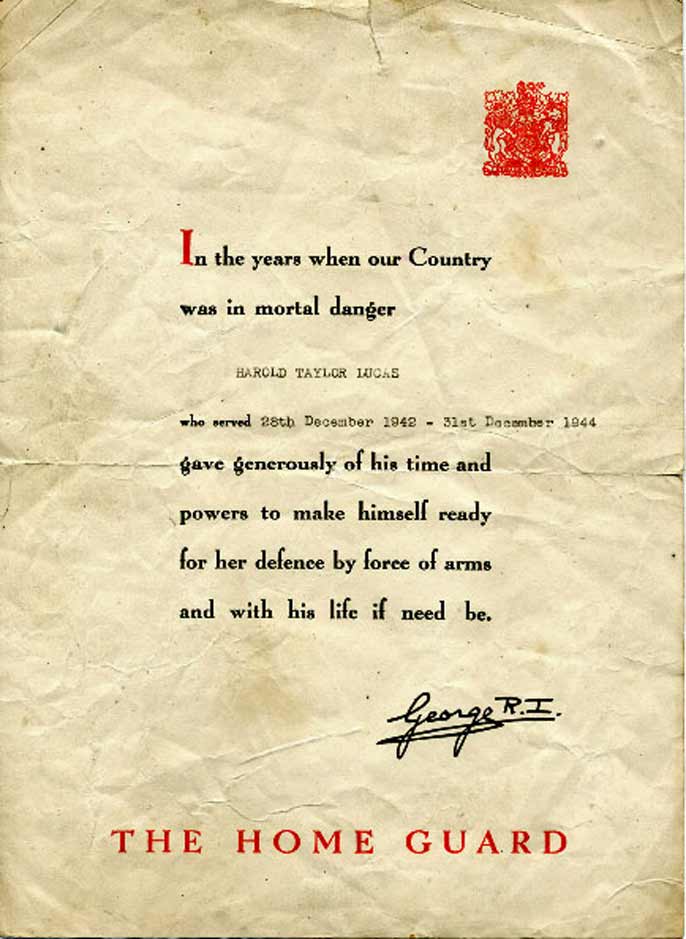
After the war Harold Lucas continued to work at Farrers until his retirement in 1978. He received then a glowing tribute from his boss: "It is men like Harold who are the backbone of the once proud British nation and I feel honoured to have known him for so long". Up until his death in January 2004 at the age of ninety he continued to remember his service to King and Country; and to recount his experiences to his family, quietly as was his style, but also with amusement and, we hope, not a little justifiable pride.
Let this page stand as a minor tribute to L./Cpl. Harold Lucas, his comrades at Billesley Common and all those Birmingham Home Guards working long hours in the city's engineering factories who, somehow or other, found the time and energy to defend their nation and community at night and at weekends for years on end.
May their dedication and sacrifice never be forgotten.
|